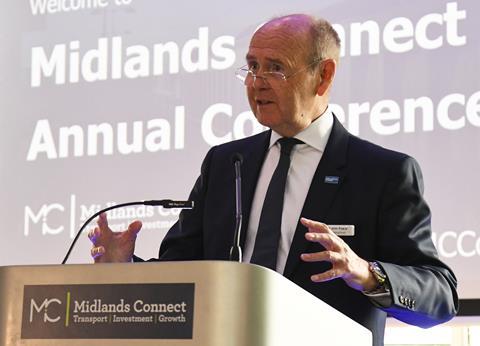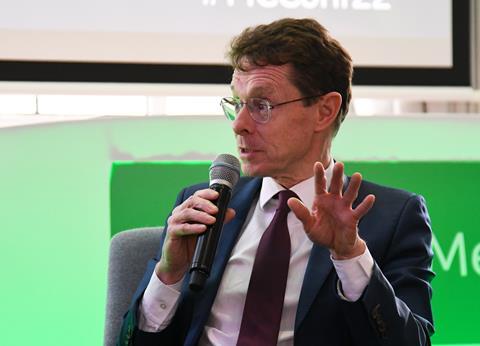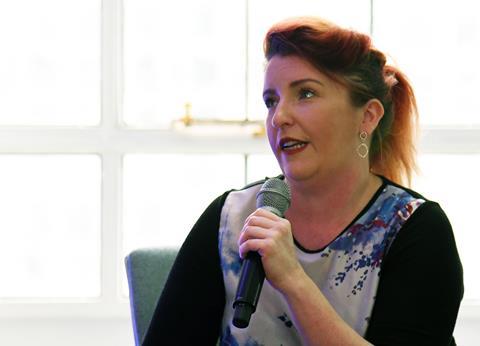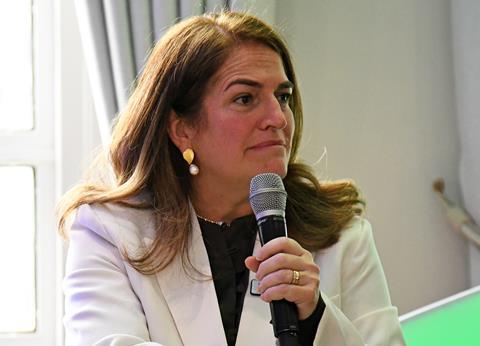
UK: More rail capacity and new services are envisaged in the Midlands Connect strategic transport plan for the region, which was launched at the organisation’s annual conference in Birmingham on April 4.
Branded Fairer, Greener, Stronger, the plan lays out the key challenges facing transport in the Midlands. Noting that a lack of mobility is holding back economic growth and productivity, it shows how levelling up and social exclusion can be addressed with better accessibility, along with the need for a significant reduction in carbon emissions.
In terms of rail, the plan calls for more passenger and freight capacity, and the introduction of ‘tap and cap’ smart ticketing across rail, buses, tram and bike hire services. Over the next 10 to 15 years Midlands Connect wants to see direct services between Coventry, Leicester and Nottingham; capacity improvements around the Kings Norton area; reinstatement of the fourth platform at Birmingham Snow Hill station; and journey time improvements on several corridors including Birmingham – Shrewsbury, Birmingham – Nottingham and Nottingham – Lincoln.
The Kings Norton and Snow Hill schemes are envisaged as precursors to the larger Midlands Rail Hub project. This includes the creation of two chords at Bordesley which would enable services from northeast and southwest of Birmingham to run into an enlarged Moor Street station adjacent to the Curzon Street HS2 station. This would effectively give Birmingham a third cross-city line and release capacity at New Street.
HS2 Eastern Leg
The conference heard repeated statements about the need to ‘work really hard’ to ensure that the case for the completion of the Eastern Leg of High Speed 2 is made during the government’s consultation on the future of the section from the East Midlands to Leeds and beyond.

West Midlands Metro Mayor Andy Street reiterated his view that budgetary constraints meant it was right to pause work on this section, but said ‘it will happen, eventually; the whole point is we had to defend the Y, we had to defend the link to Nottingham, but once the spine is there it can be extended in the future; that will happen.’
Ben Bradley, Conservative MP for Mansfield and Leader of Nottinghamshire County Council said ‘one way or another there will be a decision and there will be a commitment to build or upgrade the connection between East Midlands Parkway and Derby, Nottingham Sheffield and Leeds. There is a lot to be said for challenging the Westminster narrative around just connecting cities to cities because the East Midlands doesn’t really work like that.’
Alex Norris, Labour MP for Nottingham North said ‘we’re not quitting. We were told two years ago “give up on Midland Main Line electrification, you don’t need it”; now we’ve been given that because that’s a kind of trade-off for not having full HS2’. He said ‘you do have to keep going. Ministers change and dare I say it governments change too so that gives lots of opportunities.’
The conference heard remotely from Rail Minister Wendy Morton that HS2 Phase 1 was ‘on budget and on schedule’, while the announcement of £96bn of funding in the Integrated Rail Plan would mean that the legacy of under investment in the Midlands would be reversed. ‘I believe that the Midlands is a clear winner of the IRP’, she insisted.
Consistent plan needed

Addressing the conference in person, Labour’s Shadow Transport Secretary Louise Haigh criticised the slow pace of delivery for improvement projects nationally, noting that at the current rate DfT’s plans for electrification would take 40 years to complete.
Nobody would ‘take any bets’ on the electrification of the Midland Main Line to Derby, Nottingham and Sheffield being completed by 2030, she suggested, comparing this with progress in Germany where ‘consistent, planned and predictable investment over the last 50 years’ had delivered electrification ‘at a fraction of the cost in the UK and has electrified 60% of its network so far.’
Railway Industry Association Chief Executive Darren Caplan also called for a commitment to a pipeline of electrification, reminding the delegates that around 450 track-km/year needs to be electrified to hit the government’s target of net zero by 2050.
The conference heard repeated calls for government to deliver a consistent plan with firm, long-term plans for rail and transport in general. Caplan explained that this did not mean more funding, ‘but more certainty of funding’. He highlighted the HS2 Eastern leg, which had been ‘a plan fixed for two to three years before it was all changed in the space of two to three weeks’.
Chairman of Midlands Connect Sir John Peace called for an end to short-term political initiatives based on election terms, and a cross-party agreement that major schemes would be delivered whichever party was in power, eliminating the uncertainty that dogs the sector.
This was picked up by Alex Norris, who noted that changes to the Treasury’s ‘Green Book’ rules covering investment decisions meant that the strategic importance and not just the cost:benefit ratio must be considered, giving a cause for optimism.
‘We can’t control what goes on in the Treasury but a united voice has been excellent’, the Nottingham North MP said. ‘Across political colleagues of all hues or none you’ll see a great deal of commonality in what we’re asking for; we’ve got to be really focused on pushing through the asks being made by Midlands Connect because that gives us the best chance, and then we’ve got to hope the Treasury are for real.’
Norris also suggested that devolved decision making must become more important, adding ‘we are entering an era of better planned public transport; whatever the views are of regional devolution, the one common thing that seems to come out is that sense that local communities want a better say on planning those services.’

Adding her voice to calls for certainty, Midlands Connect CEO Maria Machancoses concluded by calling for commitment to the Midlands Rail Hub project as HS2 is delivered. Research had shown that the released capacity on the network would see more than 72 places in the Midlands benefit from new connectivity or more frequent connections, she explained. ‘Let’s have a discussion with government around how the capacity released by HS2 on the West Coast Main Line and the Midland Main Line can be used to benefit the Midlands and the country as a whole.’



